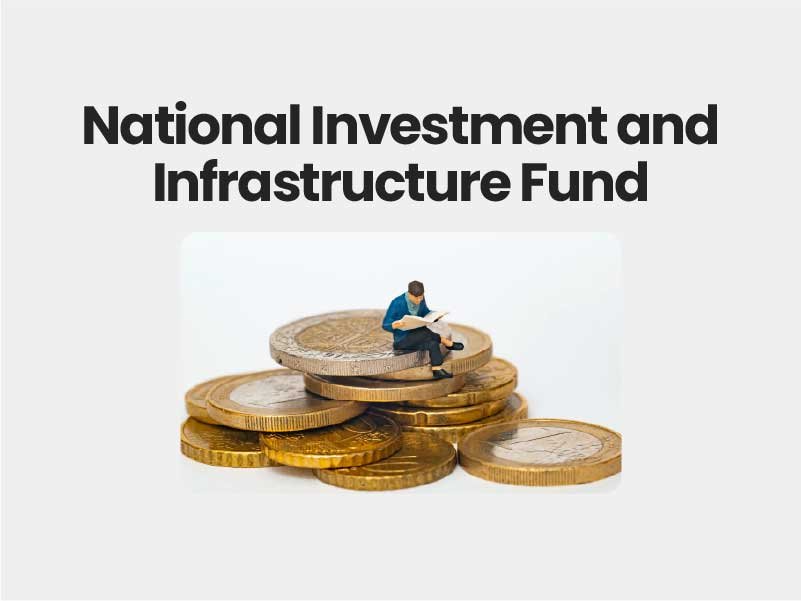
National Investment and Infrastructure Fund (NIIF)
The Government of India along with participation from institutional investors such as ADIA and leading Indian private financial institutions. A collaborative investment platform focused on Indian infrastructure with best-in-class governance and a strong team with Indian and international experience in infrastructure investing. The Indian government has a 49% stake in NIIF with the rest held by foreign and domestic investors. With the Centre’s significant stake, NIIF is considered India’s quasi-sovereign wealth fund.
Objectives:
- Commercial
- Collaborative
- Sustainable
Significance:
- NIIFL through its funds will invest in operating assets, greenfield projects and anchor third party managed funds in core infrastructure and related segments. With USD 3 billion commitment from GOI along with commitments from other institutional investors, NIIF has the ability to operate at scale whilst providing long term and patient capital.
- It intends to be a key channel of investment into Indian infrastructure with a focus on transportation (roads, ports and airports), energy, urban planning and other infrastructure and allied segments.
- The Government of India as well as its global and domestic investors, while at the same time allowing for commercial and independent decision making by the Investment Manager.
- The Board has primary responsibility for NIIFL’s activities and meets periodically for the establishment and review of NIIF’s overall strategy, but it does not involve itself in investment or operational decisions.
- NIIF’s Executive Committee comprising of the Senior management of NIIFL including its Managing Director and CEO has the responsibility for the implementation of NIIF’s strategy and operations, including all decisions related to investments.
- Investment decisions are based solely on commercial objectives in order to deliver sustained ard (CPPIB) long-term financial returns.
- Canada’s largest pension fund Canada Pension Plan Investment Board agreed to invest about $600 million in National Investment and Infrastructure Fund (NIIF) through the NIIF Master Fund.
- With CPPIB’s investment, NIIF Master Fund now has $2.1 billion in commitments and has achieved its initially targeted fund size.
NIIF currently manages three funds each with its distinctive investment mandate. The funds are registered as Alternative Investment Fund (AIF) with the Securities and Exchange Board of India (SEBI).
NIIF Master Fund
- NIIF Master Fund achieved its third and fourth close of USD 500 million and USD 150 million in August 2019 and December 2019 respectively with contributions from Ontario Teachers Pension Fund, AustralianSuper, and Canadian Pension Plan Investment Board.
- The Master Fund continues fundraising activities by exercising its green-shoe option and is in discussions with few sovereign wealth funds, large pension funds and a few other institutional investors.
NIIF Fund of Funds:
NIIF FOF has entered into definitive agreements with the Asian Development Bank. The FOF is in discussions for further fundraising for its subsequent closes.
NIIF Strategic Fund:
NIIF Strategic Fund was set up in October 2018. NIIF Strategic Fund has initiated discussions for raising further capital.
Alternative Investment Fund ( AIF):
- It means any fund established or incorporated in India which is a privately pooled investment vehicle that collects funds from sophisticated investors, whether Indian or foreign, for investing it in accordance with a defined investment policy for the benefit of its investors.
- Alternative Investment Fund is described under Regulation 2(1)(b) of the Regulation Act, 2012 of Securities and Exchange Board of India (SEBI).
- Generally, high net worth individuals and institutions invest in Alternative Investment Funds as it requires a high investment amount, unlike Mutual Funds.
- Alternative Investment Fund comprises pooled investment funds that invest in venture capital, private equity, hedge funds, managed futures, etc.
- Most alternative investment assets are held by institutional investors or accredited, high-net-worth individuals because of their complex nature, lack of regulation, and degree of risk.
Enroll today with the best civils service academy and take your first step towards your Civils journey.
Feel free to reach out to us for any inquiries, collaborations, or support. We’re here to help.

